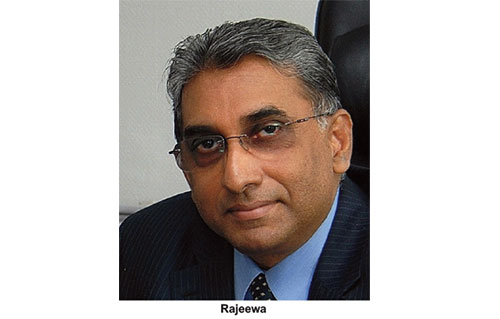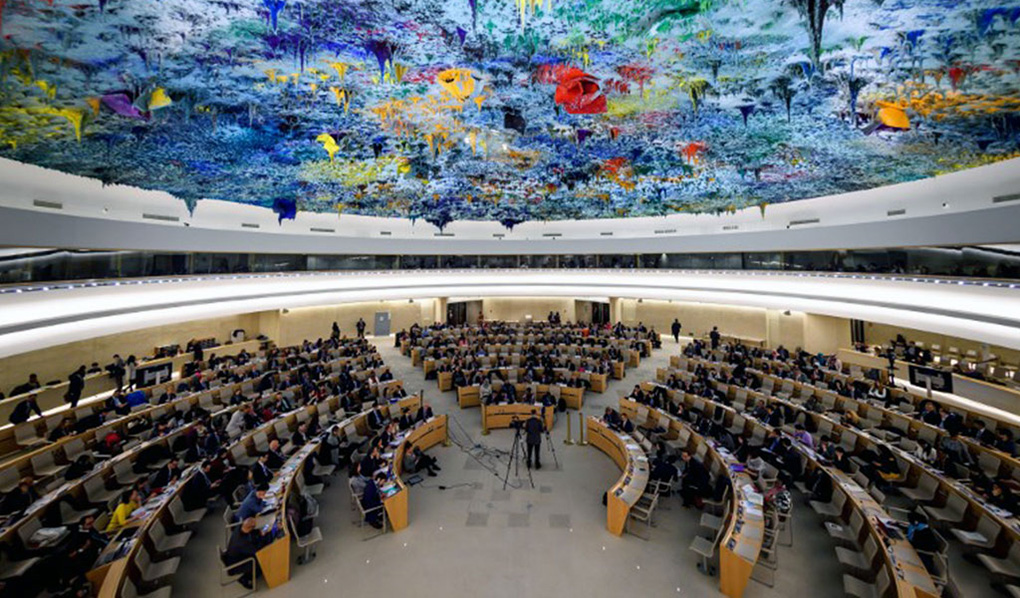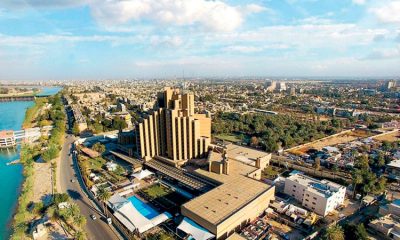Features
Remembering my brother Rajeewa Jayaweera

by Sanjeewa Jayaweera
It is a year since we lost our brother under the most tragic of circumstances. They say, “time is a great healer”; however, the grief, the sense of loss and shock have not diminished. On the contrary, we have struggled in our different ways to come to terms with his death. This despite having grieved the loss of our parents and a brother-in-law in the last decade. None of those had prepared us for the type of anguish we have undergone after his demise.
No doubt, the distress is accentuated as none of us had the slightest inclination that our brother wanted to call it a day. He was only 64- years old. He certainly camouflaged his feelings of being utterly disillusioned and weary of life from his siblings and his closest friends. At times I wonder whether I could have made a difference had I not strictly adhered to the policy of just being a listener and not an elicitor of personal information. Despite being very close, it is a principle that both of us had adopted since our teenage days. Do not pry and give advice only when sought.
It is exasperating when a few people still come up to me and murmur, “are you sure that he committed suicide and there is no hanky-panky?” The insinuation is obvious and a sad reflection of the times we live in. Unfortunately, in our country, through social media, various conspiracy theories are propagated, with most not being able to separate facts from innuendo. Even former Prime Minister Ranil Wickremesinghe came up with the theory that it was “forced suicide.” It was an irresponsible statement, given that our family had publicly acknowledged that we were satisfied that our brother had taken his own life. Those who engage in making wild and unsubstantiated statements do not realize the distress they cause to the grieving family.
In the very personal letter that Rajeewa wrote to me, which unfortunately became a public document, he mentioned a couple of medical conditions afflicting him that may cause a loss in the quality of life in the ensuing years. In addition, his disillusionment and bitterness were pretty evident by the request he made not to include the names of two persons in the obituary notice. He said that it would be hypocritical to refer to them as “beloved so and so.” In normal circumstances, these two people should have been the closest to him. The fact is that he had meticulously planned his departure for over six months. Therefore, there is no room whatsoever for any doubt. The magisterial enquiry concluded in August 2020 returned a verdict of death by suicide.
Rajeewa was a regular contributor of articles to the Sunday Island and the Island. Going through the database on his laptop, I came across 332 articles he authored over seven years. That is an average of nearly 50 articles per year which is once a week. The topics ranged from Sri Lankan Airlines, local politics, Indo-Sri Lankan relations, foreign interference in Sri Lanka and many other topical issues. I have had the time and pleasure to read most of his articles and what amazes me is the amount of research he has done to support his point of view. He was apolitical and spared neither of the main political parties acknowledged by all who read his articles. He was also brutally honest and a courageous writer.
He had written 40 articles on SriLankan Airlines. His stint at the airline spanned 17 years; thus, he was knowledgeable of the internal and aviation industry issues. When read together, the articles are a compendium revealing sheer mismanagement, abuse of perks and resources resulting from government interference, the appointment of Directors and CEO’s who have no comprehension of the aviation industry, corruption, operating of unprofitable routes, over-staffing and many others. Rajeewa’s articles explain why the taxpayers have been burdened with a company with accumulated losses of Rs. 326 billion as of March 31, 2020.
One article in particular that caught my eye is captioned “SriLankan Airlines – a tale of state abuse and mismanagement. The “games” Directors and VIPs played” published on April 10, 2016 in the Sunday Island. He laments how successive presidents used the airline as their private property commandeering aircraft meant for commercial operations to ferry the president and entourage on foreign visits. At times, the aircraft was kept for the duration of the stay, incurring significant costs, and depriving the airline of a revenue-generating aircraft. One president insisted on flight departures when he was travelling based on astrological times and not the scheduled time! There were numerous occasions when revenue passengers were offloaded for VVIP and VIP passengers and even free ticket holders who usually are directors of the airline.
In the article, Rajeewa recalls how when serving as the SriLankan airlines Manager in France in 2003, he had received a call from a cabinet minister informing that he was motoring from Brussels to Paris to join the SriLankan Airlines flight. The minister had told that he might be a bit late and, if that be the case, to delay the flight’s departure. Rajeewa had replied that the flight departure is at 14.10 hours and that he should kindly be at the check-in counter no later than 13.25 hours if he wished to join the flight. The minister had rung off, reminding Rajeewa that he was speaking to a cabinet minister.
So the flight left Paris on schedule without the minister! A massive complaint was lodged in Colombo of Rajeewa’s actions which the then CEO Peter Hill forwarded to Rajeewa with the comment “File and Forget“. Rajeewa goes on to say, “Under Emirates management, staff did not need to fear to do what was right for the airline whereas under state management, doing what is right for the airline could easily result in punitive action or worse.”
For those readers who did not know Rajeewa, his action in Paris totally encapsulates his personality. He was fearless, forthright, and not a “YES” man. Not the type of person who could survive in a government institution. It is a sad but true that contemporary Sri Lanka lacks such forthright people. There is no doubt that Rajeewa was a “chip off the old block.” Our father was his idol.
He was always a stickler for rules and the need for people to act responsibly. I recall how around 2007, I organized a trip to Dubai for my family. Our two daughters, both aged less than 10 years, were thrilled about the planned visits to the theme parks. They had previously traveled overseas on their mothers’ passport. However, a few days before our trip, when I submitted our passports for a visa, I was informed that Dubai did not grant visas for children included in the parent’s passport. They were adamant.
So, in desperation, I reached out to Rajeewa, who was based in Dhakka as Qatar Airways Regional Manager. For about 10 minutes, he lectured me about planning overseas trips with time to spare and the need for undertaking sufficient research about immigration rules as each country was different. The longer the lecture went, the less hopeful I was! However, at the end of the call, he said, “let me see what can be done.” I cannot remember exactly how the problem was solved, but we did fly out on the planned day due entirely to his efforts. I was able to save my bacon with my two daughters but learnt a good lesson. A few of his friend’s related similar incidents where he had helped them despite receiving an earful!
Many who had known Rajeewa in the countries he worked reached out to me to sympathize and relate instances when he had helped them. It filled me with joy because I often thought that his softer side was reserved only for me!
The loss of our brother will continue to hurt my three sisters and I until we depart from this world. I do not think we will ever get over it. Several others, like me, feel that Sri Lanka also lost a talented and fearless writer who contributed to the public debate on many burning issues facing our country.
I believe the poem by David Harkins that I reproduce below would be his message to the four of us and his friends who still grieve his untimely death.
He is Gone (Remember Me)
You can shed tears that he is gone,
Or you can smile because he lived,
You can close your eyes and pray that he will come back,
Or you can open your eyes and see all that he has left.
Your heart can be empty because you can’t see him
Or you can be full of the love that you shared,
You can turn your back on tomorrow and live yesterday,
Or you can be happy for tomorrow because of yesterday.
You can remember him and only that he is gone
Or you can cherish his memory and let it live on,
You can cry and close your mind, be empty and turn your back,
Or you can do what he would want: smile, open your eyes,
love and go on
Features
Prosecutorial Vs. Victim-based approaches to accountability

by Neville Ladduwahetty
A report in The Island (May 20, 2024) states that the UN human rights office has “criticised the Sri Lankan government’s failure to acknowledge and hold accountable the perpetrators of tens of thousands of enforced disappearances … Authors of the report also accuse the Liberation Tigers of Tamil Eelam of “engaging in abductions” which were described as “tantamount” to enforced disappearances” (May 20, 2024). Continuing, the report adds that the UN. The High Commissioner for Human Rights had stated: “Accountability must be addressed. We need to see institutional reform for reconciliation to succeed”.
In the meantime, the Secretary General of Amnesty International (AI) had “called for Sri Lanka to be referred to the UN Security Council and subjected to international war crimes inquiry when she participated to pay tribute to those who perished at Mullivaikkal. While the call for Sri Lanka to be referred to the Security Council may have pleased those who came to pay tribute, the reality is that such a referral would inevitably be vetoed. However, the fact remains that AI along with the UN Human Rights is advocating a prosecutorial approach to Accountability.
For instance, the Nuremberg Trial was strictly prosecutorial. In contrast, the Marshall Aid Plan was Victim based. While the objective of the former was to seek justice for the victims by prosecuting the perpetrators of the crimes, it was the latter that enabled Germany to recover and join the community of nations as a powerful and respected member.
The question that divides scholars and others who pursue accountability is; which approach to adopt. Should it be prosecutorial or victim based? While some, such as the UN report cited above advocate a prosecutorial approach for the sake of justice, others such as the High Commissioner are non-committal as to which approach to adopt. Yet, others want some aspects of both approaches. Therefore, the first question to be addressed is which approach to adopt, taking into account the particularities of the Sri Lankan society and the background that led to the armed conflict.
ESTABLISHING the CONTEXT
At a fundamental level, the raison d’etre for the armed conflict was the deep sense of grievance felt by the Tamil community; a circumstance they believed could only be overcome by resorting to an armed conflict to establish a separate state for themselves. For those representing the State of Sri Lanka, their bounden duty was to protect and preserve the territorial integrity of their cherished unitary state in keeping with Article 3 of Protocol II that state: “Nothing in the Protocol shall be invoked for the purpose of affecting the sovereignty of a State or the responsibility of the government by all legitimate means to maintain or re-establish law and order in the State or to defend the national unity and territorial integrity of the State”. The only means by which these vastly contending positions could be resolved was through an armed conflict; a fact recognized by the UN Human Rights Commission in paragraph 182 and 183 of their OISL report of 2015.
Pargraph 182 states: “Article 3 common to the four Geneva Conventions relating to conflicts not of an international character is applicable to the situation in Sri Lanka, with all parties to the conflict bound to respect the guarantees pertaining to the treatment of civilians ….”
Paragraph 183 states: “In addition, the government and armed groups that are parties to the conflict are bound alike by the relevant rules of customary international law applicable in non-international armed conflict”.
Therefore, if both the Sri Lankan State and the LTTE “are bound alike” by the relevant rules of customary international law applicable in non-international armed conflict”, why is all the attention to address accountability ONLY fixated on the Sri Lankan State and none on the LTTE. Since most of those who perished in Mullivaikkal were victims of the policy adopted by the LTTE to take civilians hostage, and continue to endanger the security of hundreds of thousands taken hostage by continuing to engage in hostilities, should NOT the LTTE also be held accountable? This being the case, would the evidence gathering that is currently being undertaken by the UNHRC in order to exercise Universal Jurisdiction, also apply to policies such as hostage taking and shooting escapees?
PROSECUTORIAL APPROACH
Judging from the attention given ONLY to the government of Sri Lanka by the UNHRC and by entities such as AI, the outcome of any judicial processes would be skewed, which means NO justice, despite the fact that the Sri Lankan Government and the LTTE “are bound alike” by relevant rules of customary international law as in common Article 3 and Protocol II; a fact confirmed below.
INTERNATIONAL COURT OF JUSTICE, Judgment of 27 June 1986,
(NICARAGUA v. UNITED STATES OF AMERICA), MERITS
Judgment – para. 215 to 292
“The conflict between the contras’ forces and those of the Government of Nicaragua is an armed conflict which is “not of an international character”. The acts of the contras towards the Nicaraguan Government are therefore governed by the law applicable to conflicts of that character; whereas the actions of the United States in and against Nicaragua fall under the legal rules relating to international conflicts. Because the minimum rules applicable to international and to non-international conflicts are identical, there is no need to address the question whether those actions must be looked at in the context of the rules which operate for the one or for the other category of conflict. The relevant principles are to be looked for in the provisions of Article 3 of each of the four Conventions of August 12, 1949, the text of which, identical in each Convention, expressly refers to conflict not having an international character” (ICJ Judgment, Nicaragua v. U.S para 215 – 292)
“In the Military and Paramilitary Activities in and against Nicaragua, the International Court of Justice observed that the acts of the Contras, fighting against the Nicaraguan Government, were governed by the law applicable to armed conflict not of an international character i.e. Common Article 3. Similarly, in the Tublada case, the Inter-American Commission considered”: Common Article 3’s mandatory provisions expressly bind and apply equally to both parties in internal conflicts, i.e. government and dissident forces. Moreover, the obligation to apply Common Article 3 is absolute for both parties and independent of the obligation of the other. Therefore, both the MTP attackers [the armed opposition group fighting in the conflict under consideration] and the Argentina armed forces had the same duties under humanitarian law” (Zegveld, Accountability of Armed Opposition Groups in International Law, p.21, ICJ Judgment Nicaragua v. US para 119 and Case No. 11/137).
Judging from the ICJ opinions cited above, it is certain that not only violations by the Sri Lanka Government but also violations perpetrated by the LTTE should be reviewed in the course of a Judicial Trial, since they are “bound alike”. Therefore, although violations by the Government forces and LTTE would be judged by Common Article 3, the fact remains that the leadership of the LTTE who ordered the taking of 300,000 plus civilians, hostage is not among the living or has disappeared, and cannot be subjected to a trial despite the fact that the act of taking civilians hostage amount to a war crime and a crime against humanity. Thus, the exercise of gathering evidence against Government perpetrators pales in significance compared with endangering the security of 300,000 plus civilians that were taken hostage. Despite this, a prosecutorial process would mean a skewed outcome of any trial because of the strong possibility that violations perpetrated by the Sri Lankan Government would dominate the trial.
Thus, while a few of those associated with the LTTE would have to face prosecution, the majority cannot be located or identified since they have acquired new identities and are domiciled in foreign countries. Also, others who were in positions to exercise command responsibility, but are no longer among the living cannot be prosecuted for the crimes committed, e.g. taking 300,000 civilians hostage and killing those who attempted to escape.
Under circumstances where it would be next to impossible to identify and prosecute former members of the LTTE because they are dispersed primarily in the West with fresh identities, a prosecutorial approach would lead to an asymmetric outcome resulting in the polarization of the two communities to a degree that could give cause for instability and even resumption of hostilities since the numbers associated with successive Governments who could be identified and prosecuted would significantly be more.
Furthermore, while it would be possible to identify those associated with the Government responsible for command, it is NOT possible to identify the leaders of the LTTE who were responsible because they are no longer among the living.
The net effect of such an asymmetric outcome following a prosecutorial process would permanently damage the efforts advocated and undertaken to bring about reconciliation.by successive Governments. For the UNHRC to include the provision in several of its Resolutions that “a credible justice process should include independent judicial and prosecutorial institutions….”, is because their perception is based on the premise that prosecuting the guilty would foster reconciliation.
While such a premise may be applicable to normal law and order situations, it is NOT applicable to Sri Lanka’s armed conflict that spanned three decades involving two communities if the prosecutorial process causes disproportionate outcomes as referred to above. Furthermore, if the outcome is such that more from the Sinhala majority community is prosecuted than from the minority Tamil community for whatever reason, the consequences would be to seriously setback the reconciliation processes; an outcome that defeats what the UNHRC hopes to achieve.
VICTIM BASED APPROACH
The real possibility of such serious outcomes, requires that the scope of the investigation is limited to such a degree that legal prosecution is not possible in the context of Sri Lanka. However, the scope of the investigation could be such that it is possible to establish the body of evidence associated with a particular incident There is strong evidence that the security forces targeted temporary hospitals despite being aware of their location. However, there is also counter evidence that the LTTE directed artillery fire from such locations and moved their ordinance soon after, thus tempting the security forces to target these make-shift hospitals. The investigation would then be limited to what each party to the conflict did in a given situation and not go beyond as to who was culpable to warrant prosecution under the relevant laws. Investigations would thus be a record of actions taken by respective parties to the conflict without delving further to establish which party was responsible for which violation of which laws, Human Rights or Humanitarian.
While this concept takes root, the leadership of both communities should jointly develop mechanisms to address the needs of victims and take joint responsibility for their implementation, instead of depending solely on the elected Government for Reconciliation to be effective and unity restored.
CONCLUSION
In light of the hard reality associated with prosecutorial processes cited above, and the ruling by the International Court of Justice in the case. Nicaragua v. U.S the “acts of the Contras fighting against the Nicaraguan Government were governed by the law applicable to armed conflict not of an international character i.e. Common Article 3…”. Therefore, the approach should be to limit investigations, not with the intent of prosecution because it would be skewed for reasons cited above. but with the intent of recording the events that occurred during the armed conflict, and which party to the armed conflict could be identified with the respective violations with a view to use this body of evidence to institute reforms to prevent recurrence.
It is indeed a matter of serious concern that successive Sri Lankan Governments have failed to acknowledge that the Sri Lankan Security Forces and the LTTE are bound alike by the laws applicable to the armed conflict in Sri Lanka. This has seriously dented addressing issues of accountability in a balanced manner.
At the end of such investigations the present leadership of the parties to the conflict should acknowledge the serious omissions and commissions committed by both parties and move on by declaring the broadest possible amnesty to all who were associated with the conflict as stated in Section 5 of Article 6 of the Additional protocol II of 1977.
Article 6 Section 5 States: “At the end of hostilities, the authorities in power shall endeavor to grant the broadest possible amnesty to persons who have participated in the armed conflict, or those deprived of their liberty for reasons related to the armed conflict, whether they are interned or detained”.
Since such amnesties and pardons have been instituted starting with the release of child soldiers and nearly 11,000 plus former LTTE combatants and more recently the release of prisoners, the practice has been in operation from time to time. This process would have gained momentum if not for the clamour for prosecutorial processes locally and resolutions of UNHRC that are tantamount to External intervention. The need therefore, is to regularize this practice and bring closure to an issue whose time has come.
Features
Stupid politicos and armed cops

 Cassandra was rather starved of grist to her mill when two VIP politicians made some stupid pronouncements, one surely manipulated and the other extempore. Speaking plain, Sri Lanka was blundering along with minor skirmishes which were not worth commenting on by Cass in her Friday Cry when 28 Tuesday gave unto her two incidents which she could go to town on. The press reported both on Wednesday (29).
Cassandra was rather starved of grist to her mill when two VIP politicians made some stupid pronouncements, one surely manipulated and the other extempore. Speaking plain, Sri Lanka was blundering along with minor skirmishes which were not worth commenting on by Cass in her Friday Cry when 28 Tuesday gave unto her two incidents which she could go to town on. The press reported both on Wednesday (29).
Referendum
General Secretary of the UNP, Palitha Range Bandara, made the stupidest statement. He noted with gravitas that due to the economic situation of the country both presidential and parliamentary elections should be postponed for two years, and a referendum conducted to obtain public approval. What he meant was that the motley of MPs of all hues that constitute the present Cabinet of Ministers and government now in power under a President who was NOT elected by the people but named by a run-away Prez to take his place, should continue with a referendum.
Referendums seem to be the plaything of the UNP. The uncle of the present leader of the Greens – J R Jayewardene – known as Tricky Dicky and The Old Fox held a referendum in 1982 to extend the life of Parliament by six years purportedly to continue uninterrupted the massive projects his government had embarked upon.
Most with hindsight heavily criticise JRJ for the referendum but admittedly there were plus points in the government of the day though of course the main reason was not wanting to lose the majority the UNP had or risk a defeat at the polls.
A much younger Cassandra thought the move was good since the Mahaweli Diversion Scheme and other projects were ongoing and the Cabinet was composed mostly of competent, educated persons.
The parlous state of the economy has been given as the reason for Range Bandara’s proposal. The Treasury itself can cough up enough money for elections to be held. Cass need not expand on this.
What Cass immediately thought was that Range Bandara was not outlining his own thought-out idea. He is only a mouthpiece or ventriloquist’s dummy. Now, who is the ventriloquist? I suppose with a strong domineering leader like Ranil W, his underlings do as directed; they won’t publicly air their views as they desire, especially with matters concerning the country’s Constitution.
Scathing comments
All political party leaders and others expressed their views which universally condemned Ranga Bandara and scorned the very mention of a referendum. It was a bit of a surprise to Cass, and I must say pleasant, that even Namal Rajapaksa criticised Bandara’s tentative toe dip to test the waters. Now that it is sure Ranil is not the favoured candidate of the SLPP, its national organiser did not mince his words when he thrashed Bandara. Dr Pakiasothy Saravanamuttu – Executive Director CPA, gave a very succinct explanation as to why a referendum was unconstitutional in this instance. The final judgments were delivered by the Head of PAFFREL, Rohana Hettiaratchi, and Director General of the Election Commission. The latter proclaimed: “The presidential election cannot be put off with the help of a referendum.” So there Mr Range Bandara, the kite you flew while someone else tugged the string, is useless.
Police outnumber protesters twenty to one
Cass strongly feels the Police Department employs far too many personnel. This excess may be due to the usual criterion for recruitment: the political chit – “He is one of our supporters. Give him a job.” There are more than enough crimes of varying degree that an alert, efficient police can prevent from maniacal driving of vehicles to drug related murders. But the number of crimes, more particularly preventable ones, increase in number. Hence, people say: “Where are the police?”
Cass saw two possés of police, one near the Nelum Mawatha SLPP office in Battaramulla on 28 May. There were about 12 protesters. They wanted to convey the message to the ruling party “to refrain from backing President Ranil Wickremasinghe’s bid to enact new laws that are inimical to the country’s interests.” As harmless as that!
Diabolical comment
Yes, a comment that is devilish and to Cass so stupid was made by Minister Prasanna Ranatunge as his car was stalled by the protestors. He just ordered the driver to move on, later commented on it. He accused “The protesting civil society activists that they were trying to cause anarchy for financial benefits.”
Anarchy? That small group of well bred, well dressed, conducting themselves admirably for the sake of the nation, attempting to create “a state of disorder due to absence or non-recognition of authority or other controlling systems.” That is one dictionary definition of anarchy. Cass accepts it here with the modification: absence of proper government authority.” Is our present government, and more so its president, continuing with proper authority?
Who is closer and definitely more capable of causing anarchy – the lot of Cabinet Ministers we now have led by Prasanna R or the protesting couple of ladies and gents? Remember how many of the present government lot created near anarchy in Parliament, their weapons of battle being chilli powder, chilli water and their brute strength.
How sick and depraved this nation’s VIPs are. There are intrepid persons who protest on streets to better matters for us, the citizens.
Features
Global lawlessness and the responsibilities of statehood

 Among the positive fallouts from the recent decision by Norway, Spain and Ireland to recognize Palestinian statehood is an indirect vindication of the much derided ‘Two State solution’ in the Middle East. For those advocating a political settlement in the turbulent region, the latter solution, which recognizes the need for two peacefully coexisting states, is the only rational answer to the long-running dehumanizing conflict.
Among the positive fallouts from the recent decision by Norway, Spain and Ireland to recognize Palestinian statehood is an indirect vindication of the much derided ‘Two State solution’ in the Middle East. For those advocating a political settlement in the turbulent region, the latter solution, which recognizes the need for two peacefully coexisting states, is the only rational answer to the long-running dehumanizing conflict.
Accordingly, sensible sections the world over are likely to endorse Irish Prime Minister Simon Harris’ position, for instance, that recognition of Palestinian statehood ‘is an important step towards permanent peace’ in the Middle East. Hopefully, the example set by the mentioned countries would motivate other states to follow suit.
It could not be stressed enough that more and more of the world’s states need to rally round the ‘Two State’ principle, since mounting international pressure on Israel and its supporters for the implementation of the said formula for peace, is likely to bear some fruit eventually although positive results from the initiative cannot be expected in the short term.
Overwhelming international pressure is likely to make a dent or more on the policy positions of the US, for example, as the conflict evolves and the US has evinced some sensitivity to international opinion of late, although much more is expected of it, considering its strong official commitment to democracy. But hard, patient work lies ahead on the matter of Middle East peace for all quarters concerned.
There is much that those major powers that are seen as ‘Swing States’ could do to take the Middle East in the direction of a peaceful settlement. ‘Swing States’ are those countries that are in a strong position to influence world opinion positively. South Africa, India and Indonesia are three powers that qualify for ‘Swing State’ status currently.
South Africa, for instance, has proved exemplary in this regard. Its initiatives in the International Court of Justice (ICJ) have compelled the latter to call on Israel to ‘immediately halt its military offensive, and any other action in the Rafah Governorate’, which could bring about ‘the physical destruction of the Palestinians.’
This ruling is of a historic nature, considering that the world’s democracies in particular could be from now on compelled to speak out unambiguously against any future Israeli actions that are seen as atrocities. Besides, the ruling would draw their attention to the need to adhere to their professed principles in governance while interacting with the rest of the world. For instance, they could acquire some awareness of the need to avoid ‘double speak’ and hypocrisy in their dealings with the rest of the international community. But here too, immediate positive changes could not be expected internationally.
However, statehood carries important rights as well as responsibilities. While the right to self-determination is integral to national sovereignty and is an inalienable right of states, crucial responsibilities devolve on sovereign states as well and these carry equal weight as rights.
Some of these responsibilities are, the scrupulous observance of International Law, compliance with the Universal Declaration of Human Rights, respectful recognition of the rights of other states, compliance with the requirements of the UN system and notable deference to the principles of multilateralism and international cooperation.
Needless to say, a future Palestinian state would need to carry out these responsibilities, while enjoying in full the rights due to it. Once the final geographical boundaries of Palestine and Israel have been decided upon, ideally with UN mediation, these states would carry the weighty responsibility of living with each other cooperatively and peacefully. Unless the states concerned live up to these expectations, it would be futile to speak in terms of the ‘Two-State Solution’ for the Middle East.
Of course, these requirements apply to Israel too and it would need to prove itself worthy of UN membership, going ahead. Thus far, Israel has left much to be desired in this repect and it is up to its principal international backers, such as the US, to awaken it to its international responsibilities. The US could begin by strongly impressing upon Israel the need to put a halt to its seemingly uncontrollable urge to expand its presence on Palestnian land. In case there is no cooperation on this score by Israel, the US should consider cutting off arms supplies to the former.
Likewise, Palestine’s international backers would need to convince a future Palestnian state of the need to consistently abide by International Law and its prime requirements.
States such as Iran should perceive that it would not be doing the Palestinian cause or the Middle East any good by aggravating current regional tensions, unconditionally backing Palestine and seeking the destruction of Israel.
Peace in the region needs to be premised on Israel’s right to exist and on its right to defend itself, besides the above considerations. If a durable Middle East settlement is to be arrived at, these requirements need to be compoulsorily met and those states that have been advocating Palestinian statehood would need to be specially cognizant of them. Among other things, they would need to rein-in Iran and those regional actors that are supportive of it, since the latter sections stand accused of aggravating the Middle East conflict by staunchly backing militant outfits, such as Hamas.
Accordingly, besides the principal parties to the Middle East problem, their international backers too play a huge role in evolving a durable solution to the long-running conflict. If the Middle East problem has proved intractable thus far, such external quarters too are responsible for this situation of gridlock because their uncritical support for the antagonists has kept the conflict raging.
Therefore, all sections that are of relevance to the Middle East conflict need to come out of their entrenched positions if some progress is to be made towards a settlement. This responsibility cannot be averted anymore because the conflict is taking on increasingly horrific proportions as the days go by.
Right now, humanity is being shamed by the ongoing murderous violence in the Middle East. It is the responsibility of the world community to prove cynics wrong by restoring humanity to its primal dignity in theatres of relentless blood-letting such as the Middle East.
The UN would need to play a principal role in such epochal restoration efforts. It is the responsibility of states and their peoples to re-energise the UN, reinvest it with its former eminence and enable it to play its crucial role as the prime peace-maker of the world.
-

 Business4 days ago
Business4 days agoSri Lanka participates in 2024 ‘Impact Harvest Forum’
-

 Business6 days ago
Business6 days agoDSI Tyres hosts Hankook Tyre Dealers’ Gathering at RIU
-

 Sports4 days ago
Sports4 days agoSri Lanka’s Para athletes shine at World Para Athletics Championships
-

 Business3 days ago
Business3 days agoDialog launches country’s first smartphone plan available to all Sri Lankans
-

 Sports6 days ago
Sports6 days agoSri Lanka’s fast bowling resources excites Ravi Ratnayake
-

 Features6 days ago
Features6 days agoExciting Events at Babylon Oberoi
-

 Editorial6 days ago
Editorial6 days agoNo general election first
-

 Features6 days ago
Features6 days agoTrump posts fake news about “the creation of a ‘Unified Reich’




























